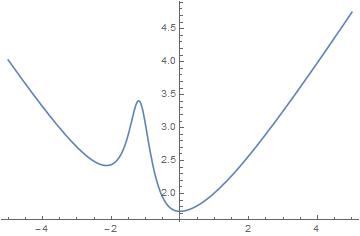I want to find min of the function $$\frac{1}{\sqrt{2 x^2+\left(3+\sqrt{3}\right) x+3}}+\frac{1}{\sqrt{2 x^2+\left(3-\sqrt{3}\right) x+3}}+\sqrt{\frac{1}{3} \left(2 x^2+2 x+1\right)}.$$ I know, the exact value minimum is $\sqrt{3}$ at $x = 0$. With Mathematica, I tried
A = 1/Sqrt[2 x^2 + (3 + Sqrt[3]) x + 3] +
1/Sqrt[2 x^2 + (3 - Sqrt[3]) x + 3] + Sqrt[(2 x^2 + 2 x + 1)/3]
NMinimize[A, {x}]
And I got
{1.73205, {x -> -2.57345*10^-16}}
When I tried
A = 1/Sqrt[2 x^2 + (3 + Sqrt[3]) x + 3] +
1/Sqrt[2 x^2 + (3 - Sqrt[3]) x + 3] + Sqrt[(2 x^2 + 2 x + 1)/3]
Minimize[A, {x}]
my computer ran about 20 minutes and I did not got the result. How can I get the exact value minimum of the given function?

